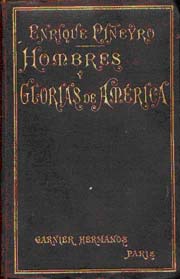3.4.1 The essay and historiography of Enrique Piñeyro (1839 – 1911)

Enrique Piñeyro was one of the Cuban intellectuals of this period who dabbled in various fields of literature, from the perspective of historical studies and essays related to these themes, with a literary profile. In 1880, he published the volume “Estudios y conferencias sobre Historia y Literatura” (Studies and Lectures on History and Literature), which compiles a large part of his output in this field, including both texts and lectures he had given in the United States and Latin America.
He took as his object of study not only the Island but also the historical events of the United States of America, which he captured in different texts, such as: “The United States in 1875”, “Men and Glories of America”, which include a series of articles under the common title of “Studies on the United States”, previously published in “Revista Cubana” and which would see the light again reformulated with the common denominator of “The conflict between slavery and freedom in the United States from 1850 to 1861”.
One of his texts that has been significant for the history of Cuba, and even of some heuristic value for the discipline itself, is “How the Domination of Spain in America Ended,” published in 1908. In it, he addresses Antonio Cánovas del Castillo’s policy regarding colonized America and its effects on the region’s inhabitants and the revolutionary fervor.
However, the text attempts to combine unrelated topics, as it appears to have been intended as a biographical sketch of the Spanish politician, and at the end, it veers off into other topics of historical interest; however, these topics break with the linearity of the exposition. Piñeyro extols the figure of Cánovas through rhetoric; but the facts he presents provide a glimpse into the true personality of the subject.
These texts reveal Piñeyro’s conservative ideological position and a progressive distancing from the insular, evident in his own attitude – almost pro-annexation – as well as in the mannerisms his style acquired, similar to those in vogue in France during the time he lived there.
Pure biography was one of the genres also cultivated by Piñeyro; some of his texts appear in “Men and Glories of America” and “American Biographies.” In this sense, his most important work was not linked to a political figure but dedicated to his friend the poet Zenea, “Life and Writings of Juan Clemente Zenea.”
In this work, although his language is supposedly sober, the author prioritizes his affection for his friend over existing documentation and at times becomes vehement in his defense, thereby losing the semblance of objectivity with which he attempts to portray his ideas. Although it is a work skewed by emotion, from a literary perspective, it successfully recreates Zenea’s lyrical personality and the political and social landscape in which he was immersed.








